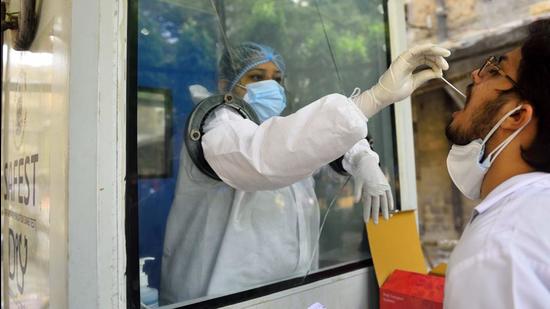Mumbai crosses 20k-mark, experts say tally inching towards peak of spike
Taking into consideration the spike, experts said that the Mumbai tally could be inching towards its peak and the Covid graph may have reached a saturation point owing to the high number of tests
Mumbai Mumbai’s case tally breached the 20,000-mark on Friday, with 20,971 fresh infections reported in the last 24 hours. With these figures, the city recorded the highest single-day spike for the third time this week.

Taking into consideration the steady rise in cases, experts said that the city’s tally could be inching towards its peak and the Covid graph may have reached a saturation point owing to the high number of tests conducted. The experts also maintained that they need to wait for at least one more week to make a concrete conclusion on the intensity of the new variant.
“With over 20,000 cases being reported regularly, we can say that we are at the peak of the spike. Cases may further increase by next week. The city has also reached a saturation point as laboratories are now overwhelmed with samples and it is taking more time than usual to get the RT-PCR test reports,” said Dr Shashank Joshi, a member of the state Covid task force.
“However, the key takeaway, for now, is that the demand for hospital beds is still not very high and most of the cases are mild. Also, we need to be safe with ourselves because the delta variant is still prevalent and most serious cases are because of the Delta,” Joshi added.
“While the spread is similar to the characteristics of the Omicron variant, it is still too early to comment on the intensity. The cases had started to spike from December 20 and we will have to wait and watch the situation till January 15, because it usually takes the variant of a virus two-three weeks to show its actual symptoms,” said Dr Rahul Pandit, director of critical care in Fortis Hospital and member of the national Covid task force and Maharashtra Covid task force.
Municipal Commissioner Iqbal Singh Chahal also said on Friday that the South African model showed that the cases peaked and began dropping after five-six weeks. Chahal said that Mumbai is already on the third week and after the next 10 days, the daily case tally may start to decline. At present, the active case tally in Mumbai stands at 91,731.
Out of the fresh infections reported on Friday, 17,616 (84%) patients were asymptomatic. The city also reported six Covid deaths on Friday, taking the overall toll to 16,394.
The daily positivity rate also declined by one per cent on Friday. With 72,442 tests done in Mumbai in the last 24 hours, the positivity rate stood at 28.94 per cent, while on Thursday, the positivity rate was around 29.90 per cent.
Meanwhile, Dharavi also reported 150 cases on Friday, making it the highest-ever single day spike since the outbreak of the pandemic.
Kiran Dighavkar, the assistant municipal commissioner from G/North ward, said that equal amount of cases are now being reported from both slum areas and residential towers.
“We are doing maximum tests possible in a day. Even though the transmission rate of the spread is high, the symptoms are very mild and nearly 75 per cent of the overall active cases in Dharavi are asymptomatic. We are also transferring the patients who are unable to isolate themselves at their home to the institutional quarantine centres,” Dighavkar said.
He also maintained that a general hospital in Dharavi has been converted into a Covid Hospital to meet the demand for beds.
Suresh Kakani, the additional municipal commissioner and in charge of public health, said that the pattern of spread is still fluctuating and it’s too early to say if the daily case tally has reached the maximum point.
“We are getting 15,000 plus cases from the last three days and the difference between Thursday’s case tally and Friday’s case tally is not very high. The pattern needs to be still watched closely in case the daily case figures start fluctuating again,” Kakani said.
Meanwhile, the figures also showed that 1,395 patients were hospitalised in the last 24 hours, due to which the bed occupancy in Mumbai also increased by 2 per cent during this period. On Friday, with 6,531 beds occupied out of the 35,645 beds, the occupancy rate stood at 18 per cent, while on Thursday the occupancy was around 16 per cent.
To ensure more Covid beds are available in Mumbai, the BMC on Friday shut all the OPD facilities in the Balasaheb Thackeray Hospital (Trauma Care Centre) at Jogeshwari and converted it into an entire Covid Hospital.
“More than 80 per cent of the beds are vacant. At present, we have 35,000 beds activated and if the need arises, the bed capacity could be increased to one lakh,” said Kakani.
Dr Mangala Gomare, the executive health officer in the BMC, said that the civic body is equipped to tackle the surge and there are enough beds in the city.
“In the recent guidelines, we have also increased the duration of home isolation. This will also help us manage beds more efficiently,” said Gomare.
He further added that many of the beds are occupied by international passengers during their isolation period and other high-risk contacts.
The recovery rate in Mumbai stood at 87 per cent, with a total of 8,490 patients discharged on Friday, taking the total number of recovered patients to 7,64,053.
Stay updated with all the Breaking News and Latest News from Mumbai. Click here for comprehensive coverage of top Cities including Bengaluru, Delhi, Hyderabad, and more across India along with Stay informed on the latest happenings in World News.
Stay updated with all the Breaking News and Latest News from Mumbai. Click here for comprehensive coverage of top Cities including Bengaluru, Delhi, Hyderabad, and more across India along with Stay informed on the latest happenings in World News.





